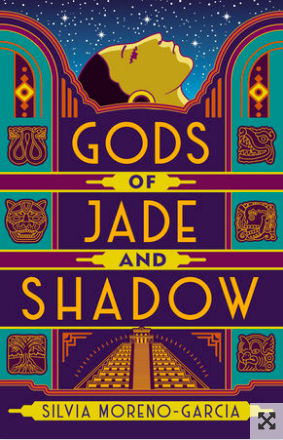Portal fantasy has it’s own special corner of the genre landscape. The form is familiar, yet rich with possibility: a door to another world appears, a choice is made, a character comes back changed … if she comes back at all. For many readers, these stories are the entrance to the idea of fantasy itself. Children who began their reading lives with Narnia or Alice in Wonderland often spent some part of their childhoods afterward opening odd cupboards and doors, hoping to find magical worlds on the other side.
Seanan McGuire’s Wayward Children series offers a fresh, nuanced take on portal fantasy. The series begins with Every Heart a Doorway, an award-winning novella that imagines a school for all the curious children who found doors to their own, bespoke worlds. These wayward children came back from their magical worlds, and now are having trouble fitting in to the real world. Some of their doors may open again, while others will never be found a second time. Each book in the series stands alone; they may be consumed in any order, like a jewel box of truffle chocolates, each one enticing and unique.
McGuire’s newest Wayward Children book, In an Absent Dream, arrives January 8, 2019. It tells the tale of Katherine Lundy’s childhood. If you’ve read the first book, you know Katherine Lundy eventually becomes one of the teachers at the school. She finds her door when she is eight years old. It leads to the Goblin Market, but this is not so much a story about the adventures that Lundy finds (and there are many) as about the rules of that world and the rules of this one. It’s about choosing, and what it means to be fair.
“ ‘We must not look at goblin men,
We must not buy their fruits:
Who knows upon what soil they fed
Their hungry thirsty roots?’
‘Come buy,’ call the goblins
Hobbling down the glen.”
In the poem Goblin Market by Christina Rossetti, Lizzie, the protagonist, finds a loophole in the rules of the sensuous goblin world. This loophole enables her to pull her sister back from the gates of death. In McGuire’s version of the Goblin Market, there are rules, too, and Lundy loves rules. The five rules are: (1) Ask for nothing; (2) Names have power; (3) Always give fair value; (4) Take what is offered and be grateful; (5) Remember the curfew. The Market itself is the arbiter of these rules, giving a wry weight to the term “market forces” when consequences become manifest.
Food in fairyland is never free. It isn’t free in the land of the dead, either. Perhaps there’s a connection? Proserpine by Dante Gabriel Rossetti.
Lundy wants a world that is fair, and she gets one. In the Goblin Market, bargains must be made and deals struck in good faith or the Market will tally a debt. Too many debts and the consequences can be permanent. Restorative justice is possible, and so is redemption by another when the debtor cannot pay, but both options are hard work. Also, in the manner of wishes, events never unfold according to the restorer or the redeemer’s plans. The dead stay dead; wounds heal, but they leave scars.
Everything is open to transaction in the Goblin Market, even relationships. When Lundy returns to the world of her birth, she longs for the automaticity of the Goblin Market’s fairness. She does her best to restore the balance with a girl she barely knows, offering her small consistent kindnesses when she sees wrong done to her. Lundy tells her she doesn’t want her to “think that no one cared about the debts.” This baffles the girl, who disappears soon after.
“Sometimes Lundy wondered about her, with her huge, sad eyes and her hollowed-out middle, not yet seventeen and already broken by people who thought children couldn’t be owed debts when things were done to them, when things were stolen. She wondered if there was a door somewhere, maybe labeled with an entreaty to be sure, that the girl could walk through and find herself finally safe, finally home. She hoped so.”
But Lundy’s compassion is flawed. As I mentioned, she loves rules. In the real world, she loves to learn them, to know them in detail, and to use them to her advantage. There’s always a good reason for her do to this, but hubris threatens.
McGuire’s book is subversive. The story initially presents itself as a sweet but serious tale about the trials and tribulations of growing up. Upon one of Lundy’s joyous returns to the Goblin Market, she is reunited with her dearest friend: “They held each other, both of them laughing and both of them weeping, and if this were a fairy tale, this is where we would leave them. Alas, that this is not a fairy tale.” McGuire’s book goes beyond the simple fairy-tale ending and into something deeper. The Goblin Market has existed for a hundred years or more. The consequences of debts incurred can and do travel across generations. There is a door to mark the border between the worlds, but people pass through, carrying their debts and burdens with them. There are promises made and promises broken to loves on either side. There are words that are truth in one moment and lies in another. Countless worlds may exist in parallel with the “real” one, but they do not exist in isolation from it. All worlds, and all hearts, are part of some greater whole. If you encounter a door, note well before you open it the admonition above the doorknob: “Be sure.”
What kind of goblin bird are you? Photo: Tony Hisgett, Birmingham, UK.

































Cadwell Turnbull's new novel — the first in a trilogy — imagines the hard, uncertain work of a fantastical justice.